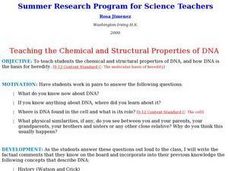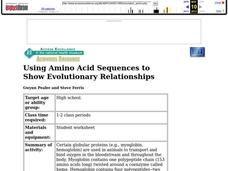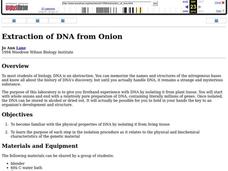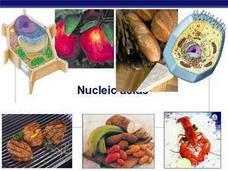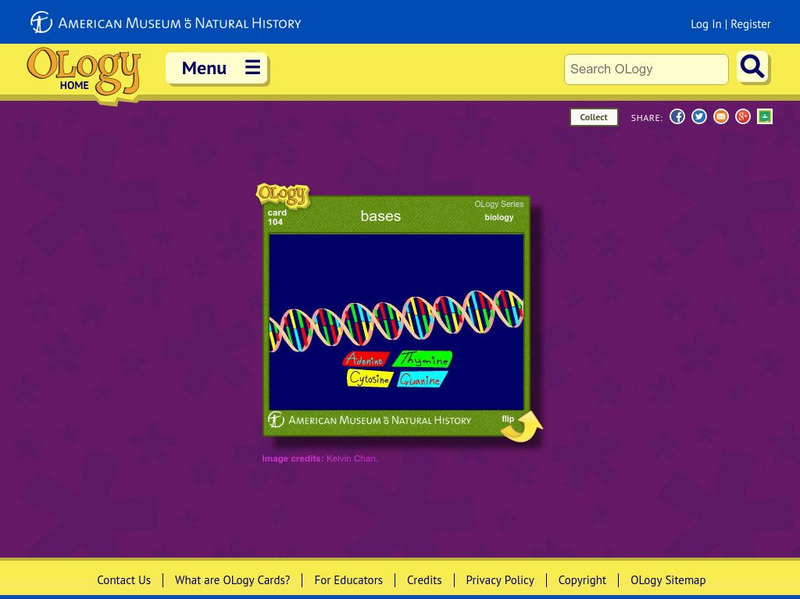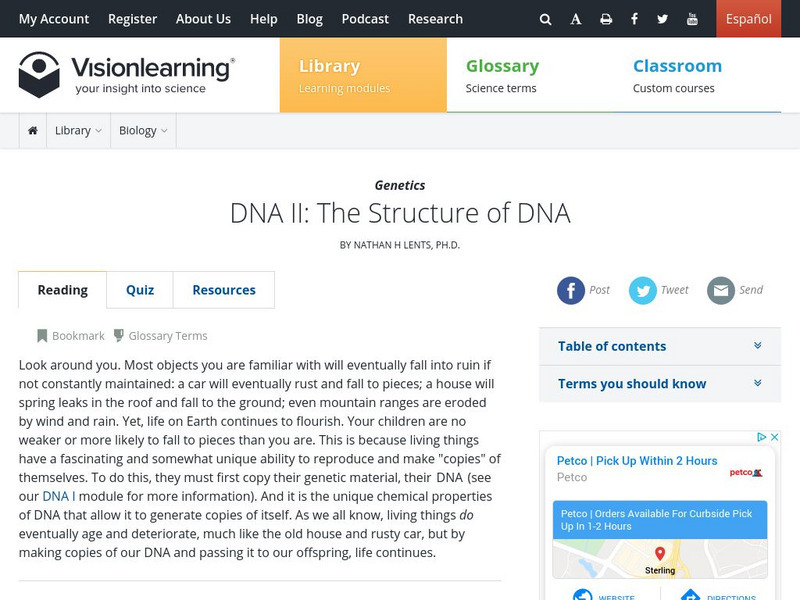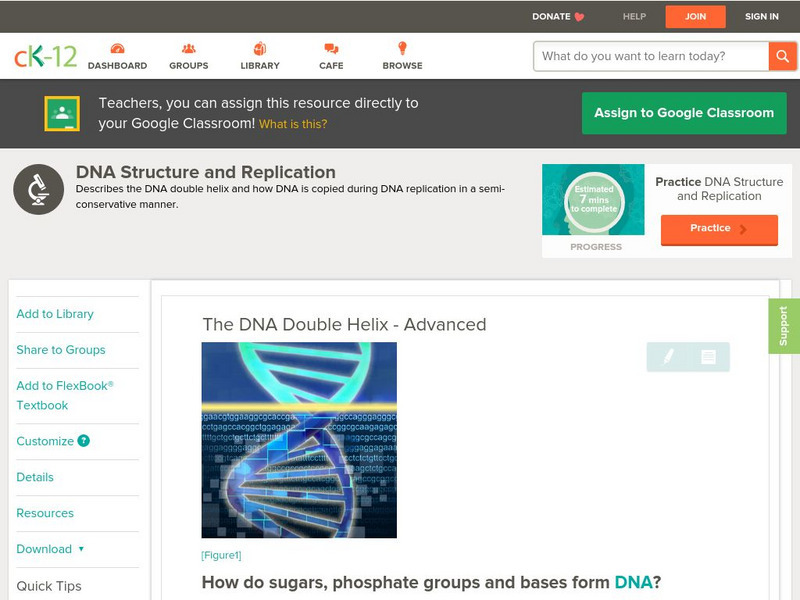Curated OER
Teaching the Chemical and Structural Properties of DNA
Students work together to answer questions about DNA. They identify where DNA is found and its function in the cell. They note any physical similarities they have with their family members
Curated OER
Extraction of DNA from Onion
Students study DNA by isolating it from plant tissue. They determine the purpose of each step in the isolation procedure as it relates to the physical and biochemical characteristics of the genetic material
Curated OER
Fingerprinting
Students discover the basics of fingerprinting and how it identifies a person. They create their own fingerprints and compare them to classmate's to determine that no two people have the same identity because of fingerprints. Then they...
Curated OER
Genes and Chromosomes
In this DNA activity, students will review vocabulary about the structure and characteristics of DNA and the processes of replication and mutation. 3 true or false questions, 6 matching questions, 5 fill in the blank statements.
Curated OER
Nucleic Acid
In this chromosome activity students complete a crossword puzzle by answering questions on DNA, nucleic acids, nucleotides and RNA.
Curated OER
Organic Chemistry
In this organic chemistry worksheet, students solve 20 problems including isomer structure, functional groups, types of reactions and the polymers that make up the structures of organic molecules.
Curated OER
Using Amino Acid Sequences to Show Evolutionary Relationships
Compare protein fragments, count amino acids, and use the information to explore common ancestry. The resource mentions a student worksheet, however, a separate printable worksheet is not provided. The exercises are written into the...
Curated OER
Extraction of DNA from Onion
Pupils experiment with DNA by isolating it from plant tissue. They investigate whole onions to prepare DNA. They complete the experiment to examine the structural characteristics of DNA.
Kenan Fellows
Unit 3: Genetic Variation
What happens when genes change? Junior genetic investigators examine the effects of mutation in the third unit of a four-part Biotechnology series. Individuals discover the types of mutations through a series of PowerPoints, then partner...
Serendip
From Gene to Protein via Transcription and Translation
DNA carries the codes for creating just the right protein. A well-designed lesson leads pupils through the process from start to finish and everywhere in between. Guiding questions with supporting video help scholars understand the...
Serendip
From Gene to Protein - Transcription and Translation
Learners identify the different steps involved in DNA transcription. In this genetics lesson, pupils complete a worksheet and model the translation process with a paper chain activity. They watch a video on sickle cell anemia and explain...
Curated OER
Nucleic Acids: information storage
This sequence of slides covers each main macromolecule that is involved with human structure and function. The history of nucleotide research and the way that they are formed is summarized, a diagram accompanies the explanation. The main...
Cornell University
The Making of Macromolecules
Compare and contrast macromolecules made from the same elements. Young scholars learn how the structure of a molecule has as much influence on a compound as the elements in the molecule. They experiment with molecular model kits to...
Curated OER
Using Amino Acid Sequences to Show Evolutionary Relationships
Junior biologists compare the amino acid sequences from fragments of five different globin molecules. They count the letter differences between each species pair. They construct a graphic representation of the evolutionary relationships...
Curated OER
A Lab Trilogy for Beginning Biology Teachers
Students are able to explain their models to other students and to their parents. Then students like to decorate the room by hanging the models or constructing mobiles of a number of models.
Curated OER
The Meaning of Genetic Variation
Students investigate variation in the beta globin gene by identifying base changes that do and do not alter function, and by using several Internet-based resources to consider the significance in different environments of the base...
Curated OER
Biology: Protein Study
Learners in pairs, select and view proteins from the Protein Data Bank. After downloading the tutorial and instructions, they identify the protein's structures and primary biological functions. Then, students present their findings to...
Cornell University
Plant Cell Crime Scene
Use science to solve the mystery of the Poplar murder. Pupils use forensic botany to determine if a suspect could be the killer. By analyzing images from a Transmission Electron Microscope, learners determine if the material found on the...
Curated OER
The Three Types of RNA
In this biology worksheet, students identify and describe the three types of RNA, messenger, transfer, and ribosomal RNA. Then they write the key features of molecules of RNA for each form.
CK-12 Foundation
Ck 12: Dna Structure and Replication
[Free Registration/Login may be required to access all resource tools.] Module describes how DNA's structure and function was discovered while summarizing the process of DNA replication. This activity also explains Chargaff's rules and...
CK-12 Foundation
Ck 12: Life Science: Dna Structure and Replication
[Free Registration/Login may be required to access all resource tools.] DNA must replicate (copy) itself so that each resulting cell after mitosis and cell division has the same DNA as the parent cell. DNA replication occurs during the S...
American Museum of Natural History
American Museum of Natural History: Dna Base Pairs O Logy Card
Flip this interactive OLogy card to find questions and answers, fast facts, and other bite-size pieces of information to help you understand DNA bases A, T, G, and C.
Vision Learning
Visionlearning: Biology: Dna Ii: The Structure of Dna
Instructional module focusing on the physical structure of DNA. Discussion incorporates the description of the nucleotides, base pairs, and the double helix shape of a DNA molecule. Site also includes an interactive practice quiz and...
CK-12 Foundation
Ck 12: The Dna Double Helix Advanced
[Free Registration/Login may be required to access all resource tools.] Students can watch a video, read some informational text and key vocabulary terms, and answer review questions about the structure of DNA.


